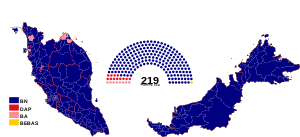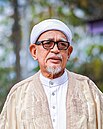
Back Eleccions generals malàisies de 2004 Catalan Elecciones federales de Malasia de 2004 Spanish Élections législatives malaisiennes de 2004 French Pemilihan umum Malaysia 2004 ID 2004년 말레이시아 총선거 Korean Pilihan raya umum Malaysia 2004 Malay Всеобщие выборы в Малайзии (2004) Russian மலேசியப் பொதுத் தேர்தல், 2004 Tamil 2004年马来西亚大选 Chinese
| |||||||||||||||||||||||||||||||||||||||||
All 219 seats in the Dewan Rakyat 110 seats needed for a majority | |||||||||||||||||||||||||||||||||||||||||
|---|---|---|---|---|---|---|---|---|---|---|---|---|---|---|---|---|---|---|---|---|---|---|---|---|---|---|---|---|---|---|---|---|---|---|---|---|---|---|---|---|---|
| Registered | 9,755,097 ( | ||||||||||||||||||||||||||||||||||||||||
| Turnout | 72.95% ( | ||||||||||||||||||||||||||||||||||||||||
| |||||||||||||||||||||||||||||||||||||||||
 Results by constituency | |||||||||||||||||||||||||||||||||||||||||
| |||||||||||||||||||||||||||||||||||||||||
General elections were held in Malaysia on Sunday, 21 March 2004. Voting took place in all 219 parliamentary constituencies, each electing one Member of Parliament to the Dewan Rakyat, the dominant house of Parliament. They were the first elections for Abdullah Ahmad Badawi as Prime Minister following his appointment in 2003. State elections also took place in 505 state constituencies in twelve of the thirteen states (except Sarawak) on the same day, which also marked the first time Sabah held its state election parallel with the other states of Peninsular Malaysia.
The result was a victory for the Barisan Nasional (BN) coalition, which received 64% of the vote (and would have gained a higher vote had all seats been contested) and won 198 seats to the combined opposition parties' 20 seats, with one independent. This was the largest majority that BN had won since the 1978. The dominant party in BN, the United Malays National Organisation (UMNO), won 109 seats, a gain of 37. UMNO's allies also gained seats; the Malaysian Chinese Association (MCA) won 31 seats, a gain of two, and the Malaysian Indian Congress (MIC) won nine seats, a gain of two.
The Pan-Malaysian Islamic Party (PAS) managed to retain only seven of its 27 seats. PAS ran on a platform promising an Islamic state, which turned off many moderate voters. In addition, the PAS leader, Abdul Hadi Awang, lost his parliamentary seat. Another opposition party, the People's Justice Party (PKR), lost four of its five seats. After five recounts, the party's leader, Wan Azizah Wan Ismail (the wife of imprisoned former Deputy Prime Minister Anwar Ibrahim), retained her seat with a majority of just 590 votes.
The third opposition party, the Democratic Action Party (DAP), which was routed in the 1999 elections, improved its performance with the re-election of party chairman Lim Kit Siang in Ipoh Timor seat and his deputy, Karpal Singh in Bukit Gelugor seat although chairman Kerk Kim Hock lost his seat. The DAP won 12 seats and regained the official leadership of the opposition in the national parliament from PAS. Most candidates who campaigned on platforms of Islamic issues lost their seats. This was a significant turnaround compared to the previous elections, where generally the more "Islamic" candidates had a greater chance of winning in the Malay heartland.


